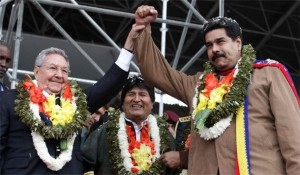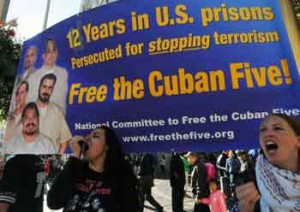GRANMA
Colombians re-elected Juan Manuel Santos and his proposal to reach peace through dialogue
Author: International Drafting | internacionales@granma.cu
June 16, 2014 00:06:16
Google translation. Revised by Walter Lippmann.
BOGOTÃ – The Colombian electorate on Sunday scored a goal in the field of betting to return to the warlike policy of former President Alvaro Uribe.
President Juan Manuel Santos won reelection for the period 2014-2018 with the support of 50.9% of the vote, which means that about 4 million 500 thousand voters joined those who had supported his proposals in the first round .
The president focused the final stretch of his campaign in the peace process that maintains in Havana with the Revolutionary Armed Forces People’s Army of Colombia and the exploratory process with the ELN.
In his first speech after the results, Santos said yesterday that the election victory is a mandate of Colombians for peace, who “voted with the hope of changing fear into hope.”
The president-elect said in this election was in the course of playing well understood Colombia and independent sectors, from left, unions, non-governmental organizations that were instrumental in his success.
“We’re going to fix everything that has to be corrected, we will adjust everything to be adjusted and we will restore all that has to be reformed, because that’s what we should bring peace, to implement deep reforms in our country” promised the president.
“I will require the support of the Colombian people,” he said.
Uribismo IS NOT DEAD
The candidate of the Democratic Centre Oscar Iván Zuluaga, who was surprised to win in the first round of voting on 25 May, but who failed to convince the majority with his attacks the Colombian peace process.
However, he enlisted the support of a significant 45% of the electorate went to the polls, which confirms the weight of Uribe’s ghost in the Colombian political scene.
Just minutes after the last newsletter of the Registrar will deliver, Zuluaga recognized the victory of his opponent.
“I feel very proud to have been a candidate for President Uribe of Colombia”, he said in reference to the political affiliation he did not hide at any time. Even made an invitation to that party from now, is better organized as it is “an alternative to Colombia.”
Another was the tone Uribe, head of the Democratic Centre. The current senator did not recognize the election victory, nor did h congratulated the President, whose candidacy Uribe described as the “most corrupt in the history of Colombia.”
Abstention this time was around 52%, lower than in the first round figure, when 6 out of 10 Colombians decided to stay at home, but still worrisome for a country that has major political and social changes to come peace with social justice.
===========================================
GRANMA
Elecciones en Colombia: paz 1, guerra 0
Los colombianos reeligieron a Juan Manuel Santos y su propuesta de llegar a la paz por la vÃa del diálogo
Autor: Redacción Internacional | internacionales@granma.cu
16 de junio de 2014 00:06:16
BOGOTÃ.—El electorado coÂlomÂbiano anotó este domingo un gol en la cancha de los que apostaban por regresar a la polÃtica guerrerista del expresidente Ãlvaro Uribe.
El presidente Juan Manuel SanÂtos obtuvo su reelección para el peÂriodo 2014-2018 con el apoyo del 50,9 % de los sufragios, lo que quiere decir que unos 4 millones 500 mil electores se sumaron a los que haÂbÃan apoyado sus propuestas en la primera vuelta.
El mandatario centró la recta final de su campaña en el proceso de paz que mantiene en La Habana con las Fuerzas Armadas Revolucionarias de Colombia-Ejército del Pueblo y el proceso exploratorio con el Ejército de Liberación Nacional.
En su primer discurso tras conocer los resultados, Santos aseguró ayer que el triunfo electoral es un mandato de los colombianos por la paz, que “votaron con la ilusión de cambiar el miedo por la esperanzaâ€.
El mandatario electo afirmó que en estos comicios estuvo en juego el rumbo de Colombia y asà lo entendieron los sectores independientes, de izquierda, sindicales, organizaciones no gubernamentales, que fueron decisivos para su triunfo.
“Vamos a corregir todo lo que haya que corregir, vamos a ajustar todo lo que haya que ajustar y vamos a reformar todo lo que haya que reformar, porque a eso nos debe llevar la paz, a poner en marcha profundas reformas en nuestro paÃsâ€, prometió el mandatario.
“Requeriré del apoyo de los coÂlombianos”, dijo.
EL URIBISMO NO ESTÃ MUERTO
El candidato del Centro DemoÂcrático Oscar Iván Zuluaga, quien habÃa sorprendido al llevarse la victoria en la primera vuelta de los comicios el 25 de mayo pasado, no logró convencer a la gran mayorÃa de los colombianos con sus ataques al proceso de paz.
Sin embargo, consiguió el apoyo de un importante 45 % del electorado que asistió a las urnas, lo que confirma el peso del fantasma uribista en el escenario polÃtico colombiano.
Tan solo unos minutos después de que se entregara el último boletÃn de la RegistradurÃa, Zuluaga reconoció la victoria de su oponente.
“Me siento muy orgulloso de haber sido el candidato del uribismo a la Presidencia de Colombiaâ€, refirió en referencia a la afiliación polÃtica que no ocultó en ningún momento. Incluso hizo una invitación para que esa colectividad a partir de ahora, se organice mejor ya que es “una alternativa para Colombiaâ€.
Otro fue el tono de Uribe, jefe del Centro Democrático. El actual senador no reconoció el triunfo electoral, ni felicitó al Presidente, cuya candidatura calificó como la de “mayor corrupción en la historia de CoÂlombiaâ€.
La abstención en esta ocasión rondó el 52 %, una cifra menor a la registrada en la primera vuelta, cuando 6 de cada 10 colombianos decidió quedarse en su casa, pero aún preocupante para un paÃs que tiene por delante importantes transformaciones polÃticas y sociales para llegar a la paz con justicia social.
http://www.granma.cu/mundo/2014-06-16/elecciones-en-colombia-paz-1-guerra-0













